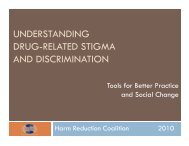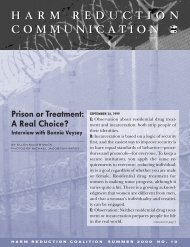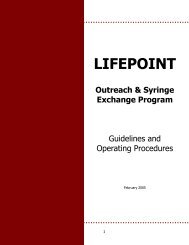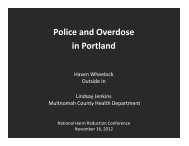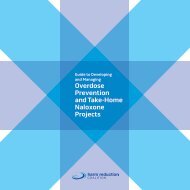9th - Harm Reduction Coalition
9th - Harm Reduction Coalition
9th - Harm Reduction Coalition
You also want an ePaper? Increase the reach of your titles
YUMPU automatically turns print PDFs into web optimized ePapers that Google loves.
<strong>9th</strong><br />
National <strong>Harm</strong> <strong>Reduction</strong> Conference<br />
FROM PUBLIC HEALTH TO SOCIAL JUSTICE<br />
Clifasefi, Seema, University of Washington, Seatlle, WA<br />
seemac@uw.edu<br />
Where <strong>Harm</strong> <strong>Reduction</strong> Meets Housing First<br />
Background: Housing first (HF) programs provide low-barrier, non-abstinence-based, immediate, supportive and permanent<br />
housing to chronically homeless people who often have co-occurring substance-use and/or psychiatric disorders.<br />
Project-based HF programs offer housing in the form of individual units within a larger housing project. Recent studies<br />
conducted at a specific project-based HF program that serves chronically homeless individuals with alcohol problems found<br />
housing provision was associated with reduced publicly funded service utilization, decreased alcohol use, and sizable cost<br />
offsets. No studies to date, however, have qualitatively explored the role of alcohol use in the lives of residents in projectbased<br />
HF.<br />
Methods: We collected data in a project-based HF setting via naturalistic observation of verbal exchanges between staff<br />
and residents, field notes taken during staff rounds, and audio recorded staff focus groups and resident interview sessions.<br />
Qualitative data were managed and coded using a constant comparative process consistent with grounded theory methodology.<br />
The goal of the analysis was to generate a conceptual/thematic description of alcohol’s role in residents’ lives. Results:<br />
Findings suggest it is important to take into account residents’ motivations for alcohol use, which may include perceived<br />
positive and negative consequences. Further, a harm reduction approach was reported to facilitate housing attainment and<br />
maintenance. Residents and staff reported that traditional, abstinence-based approaches are neither desirable nor effective<br />
for this specific population. Finally, elements of the moral model of alcohol dependence continue to pervade both residents’<br />
views of themselves and the community’s perceptions of them. Conclusions: Findings suggest it is necessary to set aside<br />
traditional models of alcohol use and approaches to better understand, align with, and address this population’s needs. In<br />
doing so, we might gain further insights into how to enhance the existing project-based HF approach by applying more tailored,<br />
alcohol-specific, harm reduction interventions.<br />
Seema Clifasefi, PhD is an Acting Assistant Professor at the University of Washington and has been part of the academic team<br />
working in partnership with the Downtown Emergency Service Center to evaluate its project-based Housing First (HF) approach<br />
since 2006. Her current focus involves research, training and evaluation in the development and dissemination of substance use<br />
interventions.<br />
Coauthors: Elizabeth A Dana; Michele P Andrasik; Natalie Stahl; Megan Kirouac (University of Washington), Callista Welbaum;<br />
Margaret King; Daniel K Malone (Downtown Emergency Service Center)<br />
Coffin, Lara, People’s <strong>Harm</strong> <strong>Reduction</strong> Alliance, Oakland, CA<br />
laracoffin@gmail.com<br />
Vein Care Tips and Tricks.<br />
Loss of veins can be devastating for a person who injects drugs. The risk of losing peripheral (arm or leg) veins, and having<br />
to rely on muscling, skin popping, femoral or jugular veins, increases with certain types of drugs, qualities of drug, and<br />
approaches to injection. This workshop will review the risks and consequences of losing veins, discuss some approaches<br />
drug users have found to cope with worsening vein access, demonstrate a vein care session, and consider what we can do<br />
as service providers to help drug users maintain or even improve their peripheral veins.<br />
Lara Coffin, MPH, is a public health researcher, consultant, and provider. She has been involved in harm reduction for the past<br />
17 years with programs and investigations in Santa Cruz, San Francisco, Ann Arbor, New York, and Seattle. Topics of particular<br />
interest to Lara include naloxone distribution program evaluation, blood-borne pathogen prevention, HIV and hepatitis C education<br />
and prevention and vein care. She also has a thing for steam punk.<br />
20



